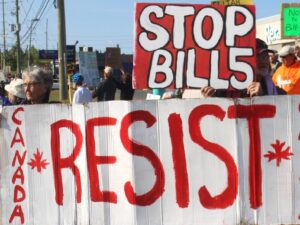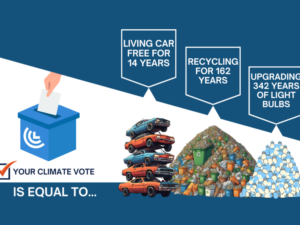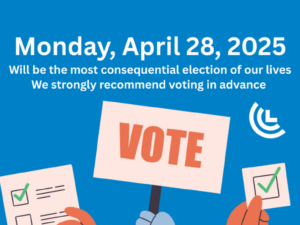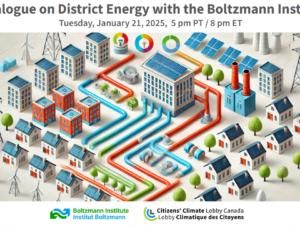In 2005, Ontario had 53 smog days. Since 2014, when electricity generation from coal ceased, we have had exactly one. When we reduce our emission of greenhouse gases (GHG) by any means, there are co-benefits. For example, we simultaneously reduce concentrations of an array of other pollutants in the air we all must breath, pollutants such as ground-level ozone, and fine particulate matter. Air pollution irritates and damages our lungs. It increases the frequency and severity of asthma in our children. It costs us money through lost productivity, lost years of life, more heart and lung disease, and substantial increases in health care costs. “Strenuous ongoing efforts to reduce our burning of fossil fuels through pricing carbon will help mitigate the worst impacts of climate change and give us cleaner air to breathe right now. It’s a win-win proposition,” says Cathy Orlando, National Director of Citizens’ Climate Lobby Canada. On March 5, Citizens’ Climate Lobby sent a survey to the four major political parties in Ontario regarding their climate change policies. As of today, three of the four parties have responded to the survey. Throughout the week, we will be releasing the results of our survey. Which specific carbon pricing policy does your party favour? Please highlight: What is your party’s position to protecting those most vulnerable from rising commodity prices as the carbon price rises? A variety of programs exist specifically to help low-income customers save on their energy bills. We are furthering the integration of fares across multiple transit service providers to save people money, increase transit ridership and reduce congestion on our roads. In Ontario, fossil fuel subsidies are estimated at $600 million. Does your party agree to end fossil fuel subsidies in Ontario? If so, which ones and by when will your party end these subsidies? What are your party’s GHG targets for 2020 and 2030? Will your party’s carbon price continue to rise past 2022? What is your party’s position on exemptions/free allocations? Industry competitiveness: Carbon pricing policies must be harmonized inter-provincially, territorially, nationally and finally, internationally. Border Tax Adjustments (BTAs) can be implemented by the Federal Government to prevent carbon leakage and protect Canadian industries from countries that currently do not have similar carbon pricing policies. What is your party’s position on the federal government using BTAs especially as the carbon price rises? What is your party’s approach to reducing methane emissions? What is your party’s position on fracking? #####The Liberal Party of Ontario Responds to a Climate Action Counts Survey
FOR IMMEDIATE MEDIA RELEASE: May 16, 2018
Media Contact: Cathy Orlando, cathy@citizensclimatelobby.org , 705-929-4043
The Ontario Liberal Party supports cap and trade as a carbon pricing policy. In 2017, we implemented a “best-in-class” cap and trade carbon pricing system, according to the Environment Commissioner, joining Quebec and California in North America’s largest carbon market as of January 1st. Our plan guarantees reductions (in emissions) every year as the cap on pollution decreases, in line with our legally binding carbon reduction targets. Thus far, our carbon market has raised $2.4 B in proceeds.
The Ontario Liberal Party has committed to returning cap and trade revenues to Ontario citizens. In the past year, hundreds of millions of dollars have been invested in projects like public transit, and energy-efficiency upgrades to social housing units, schools, and hospitals in communities across Ontario. The Green Ontario Fund is helping families save money through selected rebates and incentives. Our Climate Change Action Plan is helping First Nations communities change from diesel and other fuels to more renewable sources of energy.
The Liberals are committed to reviewing and making recommendations regarding existing policies and programs that support fossil fuel use and fossil fuel intensive technologies.
The Ontario Liberal Party are on track to meet a 15% greenhouse gas reduction target in 2020. Our goals are still 37% reduction by 2030 and 80% reduction by 2050. We enshrined these greenhouse gas reduction targets into legislation, and designed our cap decline under our cap and trade system to meet these goals. Under the cap and trade system, the market, not the government, sets the carbon price. A minimum price is imposed as a floor, rising at approximately 5% per year, to provide some certainty and stability to the market.
The Ontario Liberal Party supports the (temporary) use of transitional allowances, as industry transitions to lower carbon technologies while reducing greenhouse gas pollution. Transitional allowances help mitigate the threat of “carbon leakage”, which occurs when economic activity is shifted outside a jurisdiction that prices carbon, leading to lost jobs and no global reduction in carbon emissions. This policy will be reviewed prior to finalizing the post-2020 carbon market design.
The Ontario Liberal Party supports the development of an ambitious Canada-wide framework, supported by federal investments, that will achieve real greenhouse gas. It is imperative that we have a robust national framework in place as soon as possible that supports provincial-territorial actions to fight climate change, along with strong federal actions so that collectively we can meet our ambitious international obligations while protecting Canadian industries from carbon leakage.
The Ontario Liberal Party supports reducing the emissions of all greenhouse gases, including methane, a powerful greenhouse gas. We support reductions in methane from all sources, including transportation and fossil fuel extraction, landfill, wastewater and other sources, through all mechanisms including regulations, best management practices and offsets. Ontario has recently finalized a compliance offset protocol for methane in mining as one method to reduce methane.
The Ontario Liberal Party does not anticipate high-volume hydraulic fracking to occur in the province.
MEDIA RELEASE: The Liberal Party of Ontario Responds to a Climate Action Counts Survey
Home » CCL Canada News » MEDIA RELEASE: The Liberal Party of Ontario Responds to a Climate Action Counts Survey
MEDIA RELEASE: The Liberal Party of Ontario Responds to a Climate Action Counts Survey
Posted on May 15, 2018 in Media Release












